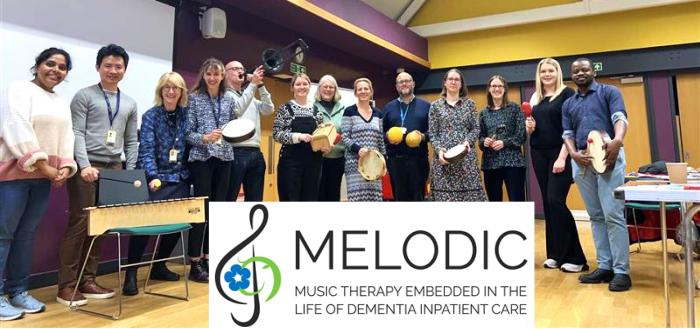The MELODIC study supported by ARC East of England is the first in the UK to successfully co-design and pilot a music therapy intervention to reduce distress on NHS inpatient dementia wards.

Photo: The MELODIC co-design team at one of their development workshops
Working with Cambridgeshire and Peterborough NHS Foundation Trust and 138 patient, staff and family member participants, the researchers found that the MELODIC music therapy can be embedded into routine ward care with adequate training and institutional support, and may help to reduce distress and improve staff–patient relationships. The research team share more in this blog.
Music can help to promote positive mood and social connection for people with dementia, even in advanced stages. It can also help to manage distress before the need for medication. Previous studies have shown that music therapy can reduce behavioural and psychological symptoms of dementia, such as depression, particularly in care home settings and further research is needed to focus on NHS hospital wards.
People with dementia admitted to NHS mental health wards are usually the most unwell, often experiencing extreme distress which can lead to physical assaults on staff and patients. More non-pharmacological approaches to managing distress are needed to support people on wards.
The idea for MELODIC was developed in response to these urgent issues raised by local healthcare providers. This project offers a personalised, evidence-based way to improve patient experiences and staff interactions on NHS dementia wards.
“We aimed to develop a new music therapy to help manage distress in a NHS hospital settings and test whether this structured, personalised intervention can be delivered and work well in NHS mental health dementia ward care. It’s the first study of its kind in the UK and the East of England to pilot standardised music therapy for people with dementia on NHS mental health wards.”
Naomi Thompson, Registered music therapist and PhD student working on MELODIC
The study was funded by the Research for Patient Benefit (RfPB) programme of the National Institute for Health and Care Research (NIHR). Researchers at Anglia Ruskin University, in partnership with Cambridgeshire and Peterborough NHS Foundation Trust (CPFT), led the study with input from music therapists, researchers, healthcare professionals, ward staff, and family members with lived experience of dementia wards. We also received input from third sector partners, including Dementia UK and the National Care Forum, which support dementia care and arts in health.
Our research team worked on the project equally with ward staff and family members in a co-design group (pictured above at one of the workshops). We also sought advisory input from several national Patient and Public Involvement (PPI) groups, which included people with lived experience of dementia, families, and frontline staff. To develop the manual, we interviewed 49 healthcare professionals, patients, carers and their families about their experiences managing distress on dementia wards and using music in everyday care and life. Their input helped us to develop the intervention.
The music therapy manual - called MELODIC, was piloted on two NHS mental health dementia wards in different parts of the UK. At different time points across the two pilot sites, 28 patients, 13 family members, and 48 staff members participated.Music therapists conducted individual assessments and developed personalised musical care plans based on each patient’s preferences and life history. Live and recorded music were used during therapy sessions and when patients and staff required support to deliver care and treatments. Staff and families were supported by the music therapist to use the musical care plans in their everyday practice to help prevent and reduce patient distress.
Participants in the project shared these comments about the impact of music therapy:
"My husband had frontotemporal dementia and was very stressed, and having the music therapy was enabling him to engage with people."
Family member participant
“There just seems to be a good atmosphere on the ward when the music therapy's taking place.”
Ward staff member participant
“I feel calmer myself because [my relative has] got something he can connect to.”
Family member participant
“It makes our work… easier. We relate more to them as well.”
Ward staff member participant
“[music] lifts you up away from what's going on round you.”
Ward patient participant
“I do hope that the way this trial has been designed, the co-design of this trial, does inspire other research groups… we will get better research and better outcomes because of that.”
Family carer in the co-design group
We found that the MELODIC intervention is feasible to deliver in NHS mental health dementia wards and showed a promising trend toward reducing distress and improving staff–patient relationships. We developed the MELODIC music therapy manual as a structured guide for implementing this intervention. It’s designed for qualified music therapists, staff and families and includes guidance for using musical care plans in daily care.
“We hope to improve quality of care for people with dementia in hospitals and provide an evidence-based alternative to medication. We also aim to influence NHS policy and workforce development. We are preparing a cluster randomised controlled trial to test effectiveness and cost-effectiveness of the MELODIC music therapy manual at scale.”
Dr Ming-Hung Hsu, Chief Investigator for MELODIC and Senior Research Fellow at ARU
Further information
- The research team are sharing updates on the project at conferences and public engagement events and will next be presenting at the national NIHR ARCs webinar on Creative arts for dementia on Wednesday 9 July from 1-2pm. Book a free ticket here.
- For team contact details, project updates and publications visit the MELODIC study page at Anglia Ruskin University
- The team hope to publish a detailed paper soon reporting the results of their feasibility study, which has been accepted by the Frontiers in Psychiatry journal.
